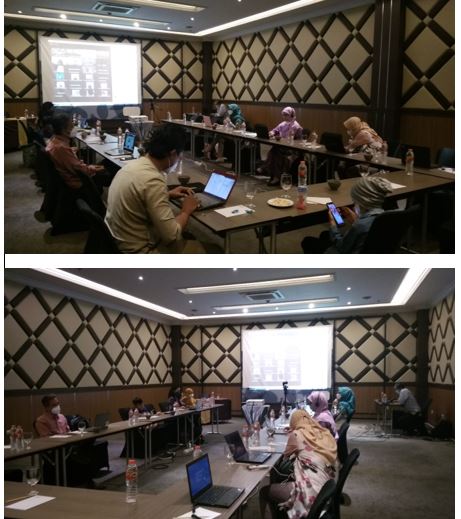 Bahasa Indonesia
Bahasa Indonesia English
English
You are here
Curriculum Cooperation Model Workshop with Universities and Schools

Saturday, September 25, 2021, the Chemistry Education Study Program, Faculty of Mathematics and Natural Sciences, UNY, held a Workshop on the Model of Collaboration for the MBKM Curriculum with Universities and Non-Universities. The Coordinator of the Chemicstry Education Study Program at UIN Sunan Gunung Djati, Bandung, Indonesia and the Head of the Islamic Senior High School 9 Al Azhar Yogyakarta, Indonesia, participated in this workshop. As many as 168 students of Chemistry Education Study Program FMIPA UNY participated in this activity throug the zoom meeting. The activity began with remarks from the Coordinator of the UNY Chemistry Education Study Program. In his remarks, Dr. Antuni Wiyarsi, M.Sc expressed the hope that the implementation of the activity would be a provision for students, especially the Chemistry Education Study Program, to behave and behave ethically during activities outside the campus within the framework of the independent campus program. The speech was continued by the Deputy Dean for Academic Affairs and Cooperation of FMIPA UNY, Prof. Jaslin Ikhsan, Ph.D said that this workshop is expected to obtain a formulation of cooperation for students and lecturers in supporting the independent campus program. Not only knowledge and skills, but hopefully students' moral attitudes and ethics can be accommodated through this activity and followed up in a cooperative model at other universities or schools.
The first speakers, Dr. Ida Farida, M.Pd as Coordinator of Chemistry Education Study Program at UIN Sunan Gunung Djati, Bandung, Indonesia conveyed about Student Academic Ethics in the RI 4.0 Era & Society 5.0 to Support the Implementation of the MBKM Curriculum. Based on his explanation, the complexity and challenges of 21st century conditions, especially in the field of education, need to focus on character building leadership, multicultural multilanguage competence, IT and knowledge base, entrepreneurial mindset, and learning community. The independent campus program supports the focus of developing an educational strategy structural system but has not shown any attention to the development of a campus culture that emphasizes the importance of moral values and the behavior of educators and students. Chemistry has content that supports scientific ethics where it integrates with student integrity such as honesty, commitment, decision-making responsibility and risk. Basically, competence can be built if you have integrity behavior. During the online learning period, student integrity can be trained through identification of plagiarism for assignments related to writing, so that several alternatives can be done, such as writing practical reports by hand. Student responsibility for the work done can produce scientific attitude responses such as curiosity, collaboration, open mindness, responsibility, critical thinking, and problem solving, creativity and innovation.
The second speakers, Head of the Islamic Senior High School 9 Al Azhar Yogyakarta, Drs. Bashori Muhammad, M.M. conveyed about the development of students' schooling practice skills in supporting the implementation of the MBKM curriculum. An introduction to the curriculum that applies at SMA Al Azhar 9 Yogyakarta, facilities, and learning activities is introduced to students of the Chemistry Education Study Program as an introduction. As for the competence of teachers, he explained as the ethical basis that students need to have while carrying out school internships and forming themselves into competent teachers. One of the competencies that attracts students' enthusiasm is about social competence. In this competency, there are many phenomena about internship students interacting with teachers at schools, students, and school employees. With the implementation of this workshop, it is hoped that it will be a provision for students to prepare themselves and develop better behavior based on applicable ethics.
Sistem Informasi
Kontak Kami
Program Studi Pendidikan Kimia
FMIPA Universitas Negeri Yogyakarta
Gedung Dekanat D.07 FMIPA UNY
Kampus Karangmalang Yogyakarta 55281
Telp. (0274)586168 Pes. 115
Email: pend_kimia@uny.ac.id
Copyright © 2024,
